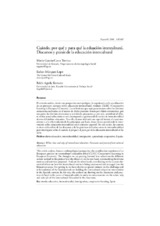Mostrar el registro sencillo del ítem
Cuándo, por qué y para qué la eduación intercultural. Discursos y praxis de la educación intercultural
| dc.contributor.author | Márquez Lepe, Esther | |
| dc.contributor.author | Agrela Romero, Belén | |
| dc.contributor.author | García-Cano Torrico, María | |
| dc.date.accessioned | 2013-12-02T13:35:53Z | |
| dc.date.available | 2013-12-02T13:35:53Z | |
| dc.date.issued | 2008 | |
| dc.identifier.uri | http://hdl.handle.net/10396/11467 | |
| dc.description.abstract | El artículo analiza, desde una perspectiva antropológica, la experiencia en la coordinación de un proyecto europeo sobre educación intercultural, titulado CLIEC (Cooperative Learning in European Contexts). Las reflexiones que aquí presentamos sobre las distintas actuaciones realizadas en el marco de dicho proyecto tienen por objeto sistematizar, por una parte, las distintas intenciones y actividades propuestas, y, por otra, contribuir al debate teórico actual sobre cómo se está construyendo y gestionando la noción de interculturalidad dentro del ámbito educativo. Para ello, hemos dedicado un especial interés al cuestionamiento y a la reformulación de los principios que hasta ahora vienen presidiendo la intervención sobre educación intercultural en el contexto español. De este modo, las autoras se sirven del análisis de los discursos y de las prácticas definidas como de interculturalidad para interrogarse sobre el cuándo, el porqué y el para qué de la educación intercultural en las aulas. | es_ES |
| dc.description.abstract | This article analyse, from an anthropological perspective, the coordination experience of an European project on intercultural education titled CLIEC (Cooperative Learning in European Contexts). The thoughts we are putting forward here related on the different actions realized in this project have the object of, on the one hand, systematizing the diverse motives and activities proposed. And, on the other hand, contributing to the current theoretical debate on how the intercultural notion is being constructed and managed into the Education scope. For getting it, we have shown an special interest on the challenge and re-formulation of the fundamentals are holding the intercultural education intervention in the Spanish context. In this way, the authors are drawing on the discourses and practices defined in the name of interculturality in order to cross-examine on the when, why and what for of the Intercultural Education in the classroom | es_ES |
| dc.format.mimetype | application/pdf | es_ES |
| dc.language.iso | spa | es_ES |
| dc.publisher | Universidad Autónoma de Barcelona | es_ES |
| dc.rights | https://creativecommons.org/licenses/by-nc-nd/4.0/ | es_ES |
| dc.source | Papers 89, 147-167 (2008) | es_ES |
| dc.subject | Educación intercultural | es_ES |
| dc.subject | Inmigración | es_ES |
| dc.subject | Aprendizaje cooperativo | es_ES |
| dc.subject | España | es_ES |
| dc.subject | Intercultural education | es_ES |
| dc.subject | Immigration | es_ES |
| dc.subject | Cooperative learning | es_ES |
| dc.subject | Spain | es_ES |
| dc.title | Cuándo, por qué y para qué la eduación intercultural. Discursos y praxis de la educación intercultural | es_ES |
| dc.type | info:eu-repo/semantics/article | es_ES |
| dc.rights.accessRights | info:eu-repo/semantics/openAccess | es_ES |

